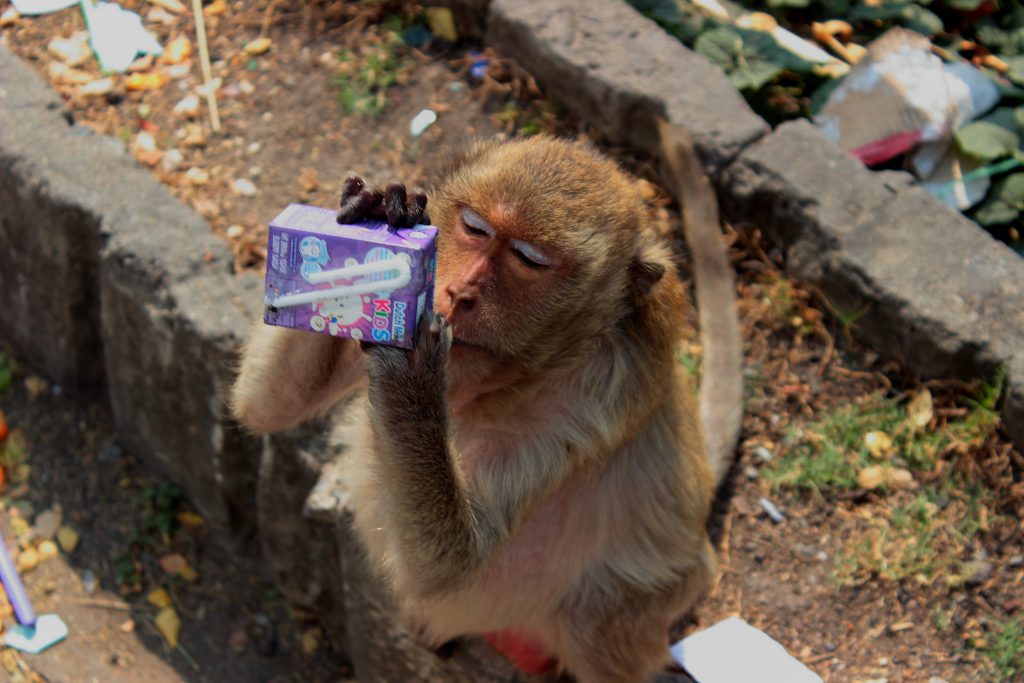Nothing is permanent, so everything is precious. Here’s a selection of some happenings—fleeting or otherwise—in the Buddhist world this week.
Aggressive Monkeys Overrun Thai City
The New York Times described Lopburi, Thailand, as “a city under siege,” because it is overrun with aggressive macaque monkeys. Although the monkeys draw tourists, the territorial species has forced dozens of businesses, including a barber shop, movie theater, and music school, to close in recent years. Buddhist tourists and residents in the area believe feeding the monkeys is a meritorious act, but with fewer people on the streets because of the coronavirus pandemic, the monkeys have become angry that their food source is gone.
People living in the Buddhist-majority culture view killing the monkeys as unethical, and with such consistent access to food, the monkeys have been able to reproduce at astonishing rates. Local wildlife officials have begun sterilizing monkeys in order to control the population, but even this has been difficult, the Times reports. On the first day of capturing monkeys, wildlife officials wore camouflage-printed uniforms. On the second day, the monkeys recognized their clothing and avoided them. Officials had to switch to wearing shorts and floral shorts, posing as tourists.
Chinese Tourists Flock to Religious Sites in Tibet Where Locals Are Barred
As coronavirus precautions have eased, large numbers of Chinese tourists have poured into Tibet’s regional capital, Lhasa, visiting places that Tibetans are highly restricted from entering, reported Radio Free Asia (RFA). The Chinese tourists have acted in ways that are disrespectful to holy sites, including littering, smoking, and posing for photos where it is forbidden. Tibetans feel that “their culture is becoming a show piece of Chinese tourists, while the Tibetans themselves are denied the opportunity to preserve and cherish their traditions,” a source told RFA, speaking on the condition of anonymity.
Rubin Museum Offers Free Meditations—and Free Entry—for Health Care Workers
The Rubin Museum of Art, a museum of Himalayan art in New York City, is offering free online mindfulness meditations every Monday at 1:00 pm EDT during the month of August. Although it remains closed to the public, the museum offers a series of online events and exhibitions, including an online stream of its Tibetan Shrine Room and a participatory installation called The Lotus Effect. On Thursday, the Rubin announced that it will, upon reopening, provide free museum admission to healthcare providers through the end of the year. “While we can’t confirm the exact date quite yet, when we reopen we want to express our immense gratitude towards those who have put their lives at risk to provide care for our communities during this pandemic, while coping with the emotional and physical impact of their work,” Executive Director Jorrit Britschgi said in an email press release. “We understand the benefits of Himalayan art on the hearts and minds of our visitors, and therefore we want to offer those who have been working hard in hospitals, nursing homes, or emergency rooms a space to find stillness, inspiration, and connection.” While New York has moved into Phase 4 of its reopening plan, museums around the city remain closed.
Buddhist Nun Elected as an Election Commissioner
Buddhist nun Geshema Delek Wangmo was elected to the Tibetan exile government’s parliament, becoming the first nun to serve as an additional election commissioner, the Tibetan Nuns Project said in a Facebook post. The Central Tibetan Administration announced the unanimous decision to elect Delek Wangmo on July 28. A teacher at Dolmaling Nunnery, Delek Wangmo was born in Kham, Tibet, in 1961, and escaped to India in 1990. She holds a Geshema degree (equivalent to a Ph.D. in Buddhist studies).
Dalits Urged to Check “Buddhism” on the Indian Census
Dalits, a term used to indicate people previously deemed “untouchable” in India’s caste system, are being urged to check Buddhism as their religion on the 2021 Indian Census, the Indian Express reported this week. In a webinar organized by the Ambedkarite International Co-ordination Society (AICS) Canada last weekend, AICS founding member Chanchal Mall said that because Dalits do not receive a separate religion column in official census documents, they should register first as Buddhists while also mentioning their respective castes, namely Ravidassia and Adhi-Dharmi, two groups of “scheduled castes” in India. In the mid-twentieth century, Dr. B. R. Ambedkar, a Dalit reformer and writer of India’s post-colonial constitution, sought to challenge the Indian caste system by converting himself and other Dalits to Buddhism, which would remove them from the caste system entirely. According to the 2011 census, fewer than one percent of Indians identified as Buddhist.
Thank you for subscribing to Tricycle! As a nonprofit, we depend on readers like you to keep Buddhist teachings and practices widely available.
